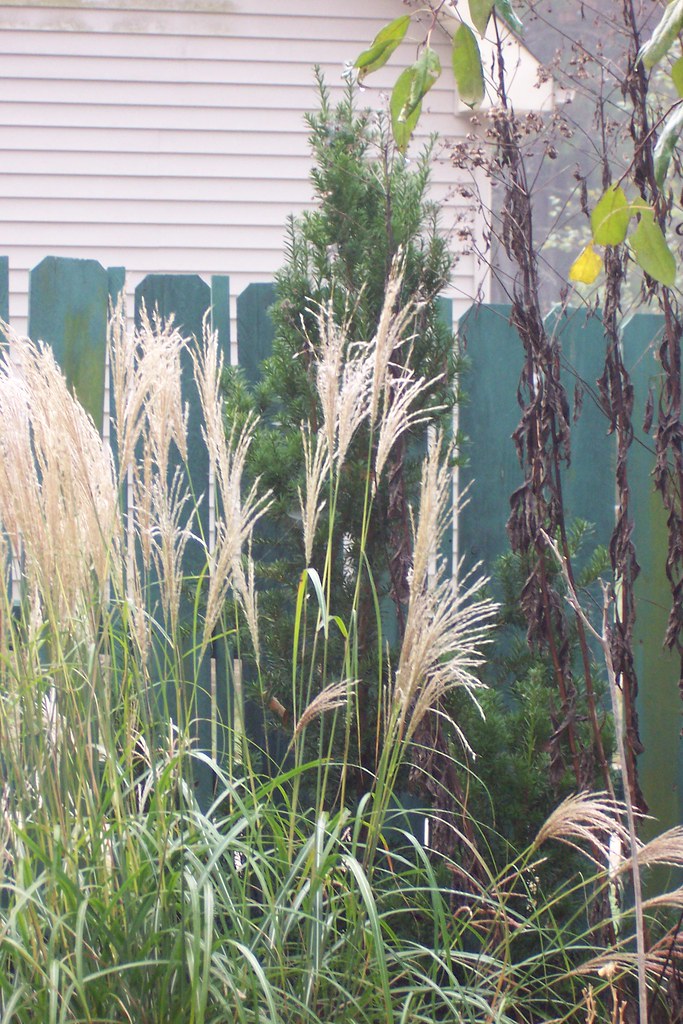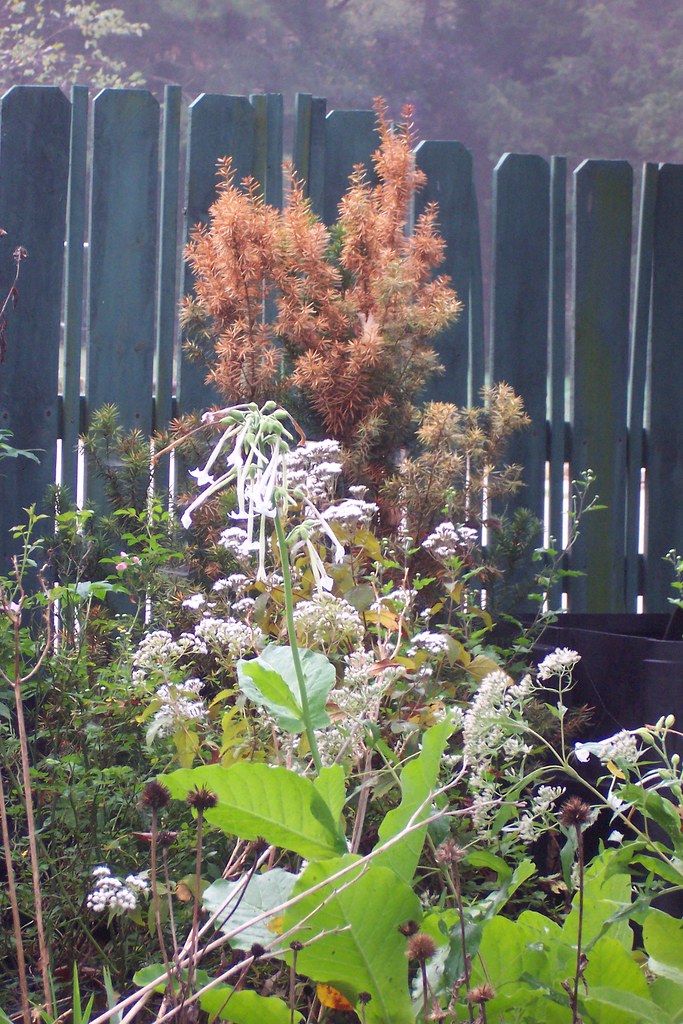
I have been growing 'Hicksii' yews for eight years now. I purchased the little evergreen shrubs in three gallon pots for what I thought was quite a significant price in 2003 (approximately $25 per pot). The eight shrubs were to be used as a privacy screen between my neighbor's home and one of my gardens. I planted them in full to part sun and in a good soil area that was not waterlogged or overly dry. The shrubs grew in a pleasing manner and even bore some berries for me in some years (all berries from yews are poisonous) then just this spring I started noticing some foliage turning brown. Uh oh. I was a bit worried but simply cut out the brown limbs and hoped for the best. As spring progressed the first two shrubs that displayed brown foliage continued to turn completely brown and had to be removed. Removing the shrubs was a big job and took a lot of might but remove them I did and replace them with something more fun. The yew pictured above is not one of the ones I removed in the spring. So far this yew is fairly healthy but right next to it is another yew that is changing its color-and it is not a welcome fall change of color.

I fear this shrub will need to be removed soon and it is a job I am not looking forward to completing. At first I thought perhaps the shrubs had been over exposed or suffered freeze damage in the spring when the problem first surfaced but then the rest of the shrubs began turning brown. I knew at this point all of the 'Hicksii' yews were doomed. I searched high and low in books and on the web for any possible information about why 'Hicksii' yews might die. The information I found was scanty at best. It seems that generally yews grow well in my part of the states in many varied conditions so I was and am still at a loss as to why these 'Hicksii' yews died. I checked for spider mites and saw no evidence of them though I may have missed the signs. Drainage could possibly be a problem as could the drought we had last summer and this year. Then again it could be the heat and humidity but I honestly don't know why the yews died. Does anyone have any experience with this happening to yews? I know one thing, I will not waste my time on these rather pricey shrubs again.....
in the garden....
Words and Photos Property of In the Garden Blog Team, In the Garden
I am so sorry for the loss of your yews, Tina. We have had losses on perfectly healthy arborvitae that have been in the ground several years as well. I believe it to be because of the drought, cumulative damage to ordinarily tough as nails shrubs. I am glad you are replacing the yews with something fun! We had to use arbs for the long hedge behind the veggie bed and I am watching the replacements closely. Good luck, my friend!
ReplyDeleteFrances
I thought they were practically indestructible shrubs...So very sorry you have to replace them. The extended droughts have to be to blame. Good luck with your new shrubs. gail
ReplyDeleteSuch a shame to lose a evergreen in the garden. I've never grown them so I have no advice unfortunately. I'm sure you'll find something better to fill those spots Tina.
ReplyDeleteI feel your pain on the loss of the trees but not the expense. The bargain Evergreens we picked up at the McCorkles sale are not looking so great these days. The two replacements are looking wonderful though. I am thinking a long hot summer and drought stressed mine to the max. But as I said, not a big expense to loose them such as your loss...
ReplyDeleteUp early today as I have a nice journey ahead...
Sorry about the loss of your yews Tina. I hate losing plants.
ReplyDeleteFlowerLady
So sorry, Tina. I'm with the gals on drought issues. I have a hedge of 16 or so that are doing very well and those in our public gardens are doing well also. (Except we did loose one because of over-watering ... hard to adjust the sprinkler heads to suit all needs in the public gardens.)
ReplyDeleteI've seen quite a few evergreens this summer turn brown like that. Arborvitaes mostly. I wonder if the wet first part of the summer spoiled them then the dry second part of summer killed them. Maybe some type of blight? I Googled it and found a website from WVU with some Yew issues: http://www.wvu.edu/~agexten/hortcult/treeshru/probyew.htm
ReplyDeleteAre these the same as Japanese Yews?
ReplyDeleteMy condolences, Tina, on the passing of the yews. How frustrating not to know why! I looked the plant up in my "Garden Problem Solver" book, and it even listed it as one that is resistant to insects and fungus.
ReplyDeleteI'm so sorry. It's frustrating when a plant dies, but even more so when you don't know the reason. I have planted several yews in my garden, but they fry. It's just too hot here. I hope you can at least find out the mystery as to why yours are not doing well.
ReplyDeleteSorry tina. I am amazed that you did not find a reason when researching and I am sure to know the reason would give a little comfort. I wonder if your local extension could id the reason if you took them a sample. They are pretty good and usually can come up with something.
ReplyDeleteHey Tina, sorry about the yews. But, I have experienced that out here quite a bit with my beloved pines. They look wonderful one day and then brownish orange spots appeared and wham next thing I know they were dead:( I understand sometimes it is location but these have been in various spots -bright sun, partial sun and even a shady area so I could never figure out what caused it. However, on a bright note the mountain cedars you suggested as a privacy fence outback took off wonderfully!!! Have a great day! ciao
ReplyDeleteSo sorry Tina on your loss. I understand that feeling. I still don't know what killed some of my hedge.
ReplyDeleteIt's always so sad to lose something we've planted, especially after spending a good amount of money on them. I have no idea what might have caused this, because yews are usually pretty hardy, but the wet spring/dry summer sounds reasonable. I have several new plants and small shrubs that I'm worried may not come back next year. This hot, dry summer was certainly tough for a lot of new plants.
ReplyDeleteHere in the UK a lot of Leylandii cypress conifers have been hit by a bug which leaves them with large brown patches apparently this is either caused by a conifer canker or drought. Maybe one of these is what has affected your yew - just an idea
ReplyDeleteTina, we lost one years ago--but we knew for sure it was the hard winter we had. So sorry about your loss. So many things have not made it this year. I think it is due to extremes in weather.
ReplyDeleteI hate it when a "background" plant like that just gives up. We had yews once. They did the same thing to us. I don't remember the variety.
ReplyDeleteI've been moving a ton of shrubs lately--it is a ton of work. I don't think digging out damaged ones will be as hard because their root system is not likely to be as strong. I DUG OUT & composted a yew; just don't like them. I have arborvitae as privacy plantings; not that I'm wild about them either, but you can;'t argue with $3.33 per gallon shrub. Well, I couldn't, anyway.
ReplyDeleteHi Tina, I don't know how yews look like but sorry about their loss. But in that first photo i saw tall grass, which looks like one in my latest post. Your garden photos now looks like ours at the start of our dry season.
ReplyDeleteThis is not a plant I am familiar with. But when I was looking at it, I imagined it will be a good plant to shade our plants against our scorching summer sun.
ReplyDeleteI am surprised since yews are so hardy even in snow, cold, heat etc. I would have to think as others that the drought has claimed them. Finding just the right evergreens can be difficult...it is very frsutrating and am so sorry that you have lost so many...
ReplyDelete